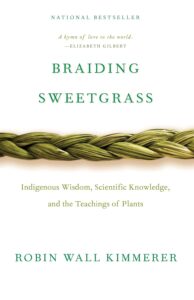Interconnectedness
By sharing stories about being close to nature, Kimmerer emphasizes the interconnectedness of all living beings and the environment. She highlights the reciprocal relationship between humans and the natural world, advocating for a more harmonious and respectful interaction with the Earth. This interconnectedness is not just a philosophical concept but a fundamental truth that shapes our existence and responsibilities as stewards of the planet.
I was moved by the give and take she described, rather than the one-sided expectation that the gifts the land gives us are ours for the taking regardless of the consequences. In one chapter, she talks about the practice of building dams without any forethought about the impact on the ecosystems that would forever be changed. For example, have you ever considered what would happen to the spawning activities of salmon if their rivers were suddenly dammed up and they couldn’t get through? It’s a grim outcome.
Indigenous Wisdom
The author shares the wisdom of indigenous cultures, often centering her own Potawatomi worldview. Every chapter tells a story and shares traditional ecological knowledge. Kimmerer shares insights into sustainable practices, reverence for nature, and the importance of reciprocity in human-environment relationships.
One example of this shows up a few times in the stories, in which she describes the process of harvesting plants that are growing in the wild. In the Indigenous way, she never takes the first plant she finds. Instead, she carries on and harvests from subsequent finds. This takes place in the spirit of respect and preservation.
Ethical Responsibility
Braiding Sweetgrass underscores the ethical responsibility humans have towards the Earth and future generations. Kimmerer calls for a shift from a mindset of exploitation and extraction to one of reciprocity and caretaking. She argues that we must recognize our roles as participants in the ecological community and act with humility, gratitude, and respect towards all living beings.
In one chapter, she shattered my heart into a million pieces as she described the slow and gruesome demise of a lake as the result of pollution from big industry. While she highlights the resilience of the natural world (over a long, long time), she also highlights that the damage is not all reversible.
Kimmerer advocates for integrating indigenous wisdom into discussions about anything to do with the environment, including any proposals for changes or policies that are to be written. Imagine if people worried less about making money and more about conserving the integrity of our natural world for the sake of those who are going to be here long after we have left?
Going Forward
I hope that books like this one will be shared far and wide so that readers will be inspired to reconsider their relationship with nature, embrace the learning that comes from indigenous perspectives, and strive for a more sustainable and harmonious coexistence with the Earth.
Join the conversation by commenting below.
Have you read Braiding Sweetgrass?
What moved you the most about this book?
